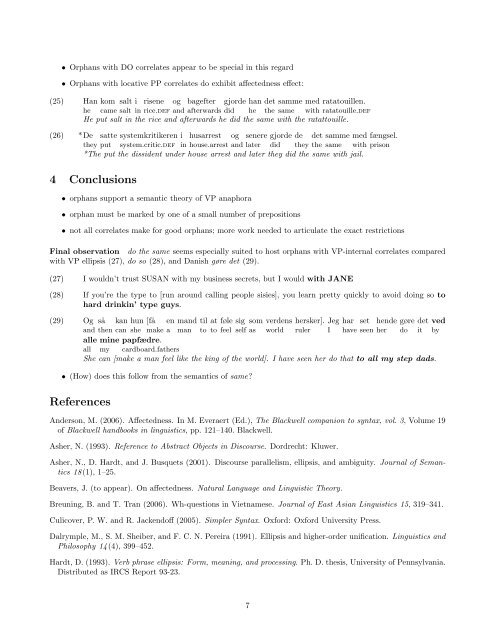handout - Linguistics
handout - Linguistics
handout - Linguistics
Create successful ePaper yourself
Turn your PDF publications into a flip-book with our unique Google optimized e-Paper software.
• Orphans with DO correlates appear to be special in this regard<br />
• Orphans with locative PP correlates do exhibit affectedness effect:<br />
(25) Han kom salt i risene og bagefter gjorde han det samme med ratatouillen.<br />
he came salt in rice.def and afterwards did he the same with ratatouille.def<br />
He put salt in the rice and afterwards he did the same with the ratattouille.<br />
(26) *De satte systemkritikeren i husarrest og senere gjorde de det samme med fængsel.<br />
they put system.critic.def in house.arrest and later did they the same with prison<br />
*The put the dissident under house arrest and later they did the same with jail.<br />
4 Conclusions<br />
• orphans support a semantic theory of VP anaphora<br />
• orphan must be marked by one of a small number of prepositions<br />
• not all correlates make for good orphans; more work needed to articulate the exact restrictions<br />
Final observation do the same seems especially suited to host orphans with VP-internal correlates compared<br />
with VP ellipsis (27), do so (28), and Danish gøre det (29).<br />
(27) I wouldn’t trust SUSAN with my business secrets, but I would with JANE<br />
(28) If you’re the type to [run around calling people sisies], you learn pretty quickly to avoid doing so to<br />
hard drinkin’ type guys.<br />
(29) Og s˚a kan hun [f˚a en mand til at føle sig som verdens hersker]. Jeg har set hende gøre det ved<br />
and then can she make a man to to feel self as world ruler I have seen her do it by<br />
alle mine papfædre.<br />
all my cardboard.fathers<br />
She can [make a man feel like the king of the world]. I have seen her do that to all my step dads.<br />
• (How) does this follow from the semantics of same?<br />
References<br />
Anderson, M. (2006). Affectedness. In M. Everaert (Ed.), The Blackwell companion to syntax, vol. 3, Volume 19<br />
of Blackwell handbooks in linguistics, pp. 121–140. Blackwell.<br />
Asher, N. (1993). Reference to Abstract Objects in Discourse. Dordrecht: Kluwer.<br />
Asher, N., D. Hardt, and J. Busquets (2001). Discourse parallelism, ellipsis, and ambiguity. Journal of Semantics<br />
18 (1), 1–25.<br />
Beavers, J. (to appear). On affectedness. Natural Language and Linguistic Theory.<br />
Breuning, B. and T. Tran (2006). Wh-questions in Vietnamese. Journal of East Asian <strong>Linguistics</strong> 15, 319–341.<br />
Culicover, P. W. and R. Jackendoff (2005). Simpler Syntax. Oxford: Oxford University Press.<br />
Dalrymple, M., S. M. Sheiber, and F. C. N. Pereira (1991). Ellipsis and higher-order unification. <strong>Linguistics</strong> and<br />
Philosophy 14 (4), 399–452.<br />
Hardt, D. (1993). Verb phrase ellipsis: Form, meaning, and processing. Ph. D. thesis, University of Pennsylvania.<br />
Distributed as IRCS Report 93-23.<br />
7

















